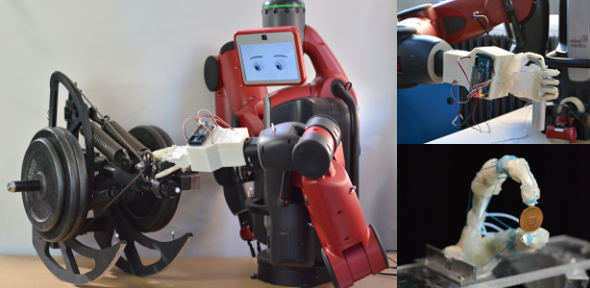
The human hand has an amazing ability to precisely manipulate objects. This is possible because of the mechanoreceptors, sensory system, physical structure and mechanical properties of the hand. This project addresses the challenge of developing robotic hands which can similarly adapt to the variations of complex objects using tactile sensing.
Over time, robotics research on hand grasping and manipulation has evolved from single rigid manipulators to more specialized, dexterous human-like robotics arms, capable of grasping and manipulating a wide range of daily living objects and performing vastly different tasks in unstructured and uncertain environments. This project seeks to further extend such capabilities through the development of an adaptive tactile sensing robotic hand using the functional material, Conductive Thermoplastic Elastomer (CTPE), which can be used as a strain sensing material. The material has interesting mechanical properties, allowing it to be produced in a wide range of shape morphologies, whilst also being electrically conductive.
Integration of non-segmented continuous sensors developed using CTPE into robotics systems as tactile sensors, has the potential to significantly improve upon current state-of-the art systems, particularly with respect to adaptability to uncertain conditions, repeatability and functionality. The end goal of the project is the development of soft robotics applications such as anthropomorphic robotic hands capable of tactile sensing of a variety of physical interactions in unknown environments.



